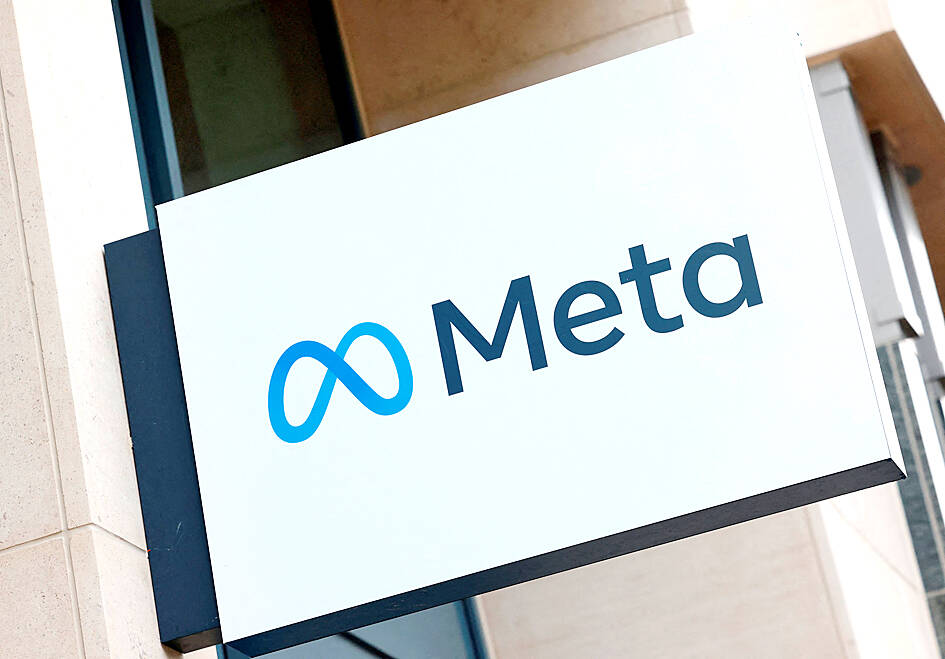Meta Platforms Inc is cutting about 5 percent of its staff through performance-based terminations and plans to hire new people to fill their roles this year, an internal memo sent to all employees said.
As of September last year, Meta employed about 72,000 people, so a 5 percent reduction could affect about 3,600 jobs.
“I’ve decided to raise the bar on performance management and move out low-performers faster,” Meta CEO Mark Zuckerberg said in the note posted to an internal message board and reviewed by Bloomberg News.

Photo: Reuters
“We typically manage out people who aren’t meeting expectations over the course of a year, but now we’re going to do more extensive performance-based cuts during this cycle,” he said.
Meta’s performance cycle is expected to wrap up next month, said a person familiar with the matter, who asked not to be identified discussing internal company procedures.
Affected workers in the US are expected to be notified on Feb. 10, while those based in other countries are to be informed at a later date, the memo said.
The terminations would only include staff who have been at the company long enough to be eligible for a performance review.
Zuckerberg told employees that the company would “provide generous severance” in line with past cuts.
Zuckerberg had declared 2023 the company’s “year of efficiency” and announced plans then to eliminate 10,000 positions. Now, he has taken on a different tone.
In a note to managers, he said that the performance-based cuts are aimed at ensuring the company has the “strongest talent” and is able to “bring new people in.”
Altogether, Meta expects its headcount to be down 10 percent by the end of the current performance cycle.
That total includes an additional 5 percent reduction from attrition last year, according to the message to managers.
The Menlo Park, California-based company that includes Facebook, Instagram and WhatsApp would make headcount decisions for each organization based on their respective number of reductions last year.
Zuckerberg last week announced a series of changes at Meta, including disbanding US-based fact-checking on its platforms, ending many of its diversity and inclusion efforts, and changing its “hateful conduct” policy to allow more flexibility around language used to discuss immigrants, women, and transgender and nonbinary people.
In the note to staff, Zuckerberg said that he was positioning the company for what he expects to be an “intense year” focused on artificial intelligence, smart glasses and the future of social media.
Meta is not alone in making performance-based job cuts at the start of the new year. Last week, Business Insider reported that Microsoft Corp would be making job cuts targeting underperforming employees.

ADVANCED: Previously, Taiwanese chip companies were restricted from building overseas fabs with technology less than two generations behind domestic factories Taiwan Semiconductor Manufacturing Co (TSMC, 台積電), a major chip supplier to Nvidia Corp, would no longer be restricted from investing in next-generation 2-nanometer chip production in the US, the Ministry of Economic Affairs said yesterday. However, the ministry added that the world’s biggest contract chipmaker would not be making any reckless decisions, given the weight of its up to US$30 billion investment. To safeguard Taiwan’s chip technology advantages, the government has barred local chipmakers from making chips using more advanced technologies at their overseas factories, in China particularly. Chipmakers were previously only allowed to produce chips using less advanced technologies, specifically

The New Taiwan dollar is on the verge of overtaking the yuan as Asia’s best carry-trade target given its lower risk of interest-rate and currency volatility. A strategy of borrowing the New Taiwan dollar to invest in higher-yielding alternatives has generated the second-highest return over the past month among Asian currencies behind the yuan, based on the Sharpe ratio that measures risk-adjusted relative returns. The New Taiwan dollar may soon replace its Chinese peer as the region’s favored carry trade tool, analysts say, citing Beijing’s efforts to support the yuan that can create wild swings in borrowing costs. In contrast,

TARIFF SURGE: The strong performance could be attributed to the growing artificial intelligence device market and mass orders ahead of potential US tariffs, analysts said The combined revenue of companies listed on the Taiwan Stock Exchange and the Taipei Exchange for the whole of last year totaled NT$44.66 trillion (US$1.35 trillion), up 12.8 percent year-on-year and hit a record high, data compiled by investment consulting firm CMoney showed on Saturday. The result came after listed firms reported a 23.92 percent annual increase in combined revenue for last month at NT$4.1 trillion, the second-highest for the month of December on record, and posted a 15.63 percent rise in combined revenue for the December quarter at NT$12.25 billion, the highest quarterly figure ever, the data showed. Analysts attributed the

Taiwan Semiconductor Manufacturing Co’s (TSMC, 台積電) quarterly sales topped estimates, reinforcing investor hopes that the torrid pace of artificial intelligence (AI) hardware spending would extend into this year. The go-to chipmaker for Nvidia Corp and Apple Inc reported a 39 percent rise in December-quarter revenue to NT$868.5 billion (US$26.35 billion), based on calculations from monthly disclosures. That compared with an average estimate of NT$854.7 billion. The strong showing from Taiwan’s largest company bolsters expectations that big tech companies from Alphabet Inc to Microsoft Corp would continue to build and upgrade datacenters at a rapid clip to propel AI development. Growth accelerated for